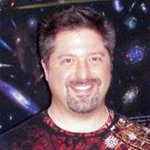sfwa_admin
in
sfwa
Ten Terrific Resources for
Writing Space-Based Hard Science Fiction
by Mike Brotherton

Hard science fiction is science fiction without mistakes in the science, at least not very big ones. You can still be very speculative and far out, but you can’t violate what we know about how the universe works without spoiling the suspension of disbelief. While there’s a lot we don’t know, there’s wikipedias full of what we do, and it can be intimidating even if you’ve got a PhD in a scientific subject. I’m a professional astronomer, but there’s plenty of room for me to screw up when it comes to geology, biology, or any of another half dozen subjects.
I would like to share ten resources, more or less, that I think are really terrific when it comes to getting the science right. These will be biased toward my areas of expertise, and will span books, websites, and software. Old-fashioned books first.
1. Mallove, Eugene F., and Matloff, Gregory L. The Starflight Handbook: A Pioneer’s Guide to Interstellar Travel, Wiley Science Editions. New York: Wiley, 1989. This book is one-stop shopping for nearly every serious idea put forward in the last few decades, although it is not 100% complete (e.g., the Alcubierre Drive is missing). The relativistic rocket equation is a bonus. Maybe you could search dozens of wiki pages for the same information, but this is a book worth having on the shelf.
2. Stine, G. Harry. Living in Space: A Handbook for Work & Exploration Beyond the Earth’s Atmosphere. 1st ed. New York: M. Evans and Co., 1997. This is the book I go to when I’m worrying about what kind of accelerations humans can survive. Or radiation doses. Or any of a bunch of dangerous things my characters might encounter in space. (Also worth checking out: Mullane, R. Mike. Do Your Ears Pop In Space and 500 Other Surprising Questions About Space Travel. Wiley, 1997.)
3. Sheffield, Charles. Borderlands of Science. This book is a readable summary of a number of areas of science: physics, astronomy, chemistry, biology, etc., with an emphasis on topics most likely to concern a science fiction writer. The solar system and space flight both get long chapters to themselves, for example. Chaos theory gets a big chapter too - bigger than it deserves probably - but is interesting enough. This book is a handy starting place for an sf writer, but doesn’t really go into enough detail to do more than spark a story. The bibliography is therefore unfortunately thin (but at least there is one!).
Read the rest of this entry »
Mirrored from SFWA | Comment at SFWA